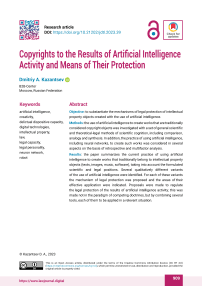Copyrights to the Results of Artificial Intelligence Activity and Means of Their Protection
Автор: Kazantsev D. A.
Журнал: Journal of Digital Technologies and Law @lawjournal-digital
Статья в выпуске: 1 (4), 2023 года.
Бесплатный доступ
Objective: to substantiate the mechanisms of legal protection of intellectual property objects created with the use of artificial intelligence. Methods: the use of artificial intelligence to create works that are traditionally considered copyright objects was investigated with a set of general scientific and theoretical-legal methods of scientific cognition, including comparison, analogy and synthesis. In addition, the practice of using artificial intelligence, including neural networks, to create such works was considered in several aspects on the basis of retrospective and multifactor analysis. Results: the paper summarizes the current practice of using artificial intelligence to create works that traditionally belong to intellectual property objects (texts, images, music, software), taking into account the formulated scientific and legal positions. Several qualitatively different variants of the use of artificial intelligence were identified. For each of these variants the mechanism of legal protection was proposed and the areas of their effective application were indicated. Proposals were made to regulate the legal protection of the results of artificial intelligence activity; this was made not in the paradigm of competing doctrines, but by combining several tools, each of them to be applied in a relevant situation. Scientific novelty: the paper presents ontological differentiation of the results of artificial intelligence activity and the corresponding mechanisms of their legal protection. The author propose to consider the results of activity created by artificial intelligence not as a single object of legal regulation, but as a set of externally similar, but ontologically different objects, each requiring a separate approach to legal protection. Practical significance: the ontological differentiation of the results of artificial intelligence activity and their corresponding legal protection mechanisms proposed in this paper is relevant both as a basis for further research and as proposals to supplement civil legislation.
Artificial intelligence, creativity, delictual dispositive capacity, digital technologies, intellectual property, law, legal capacity, legal personality, neuron network, robot
Короткий адрес: https://sciup.org/14128452
IDR: 14128452 | УДК: 34:004:34.096:347.211:004.8 | DOI: 10.21202/jdtl.2023.39


